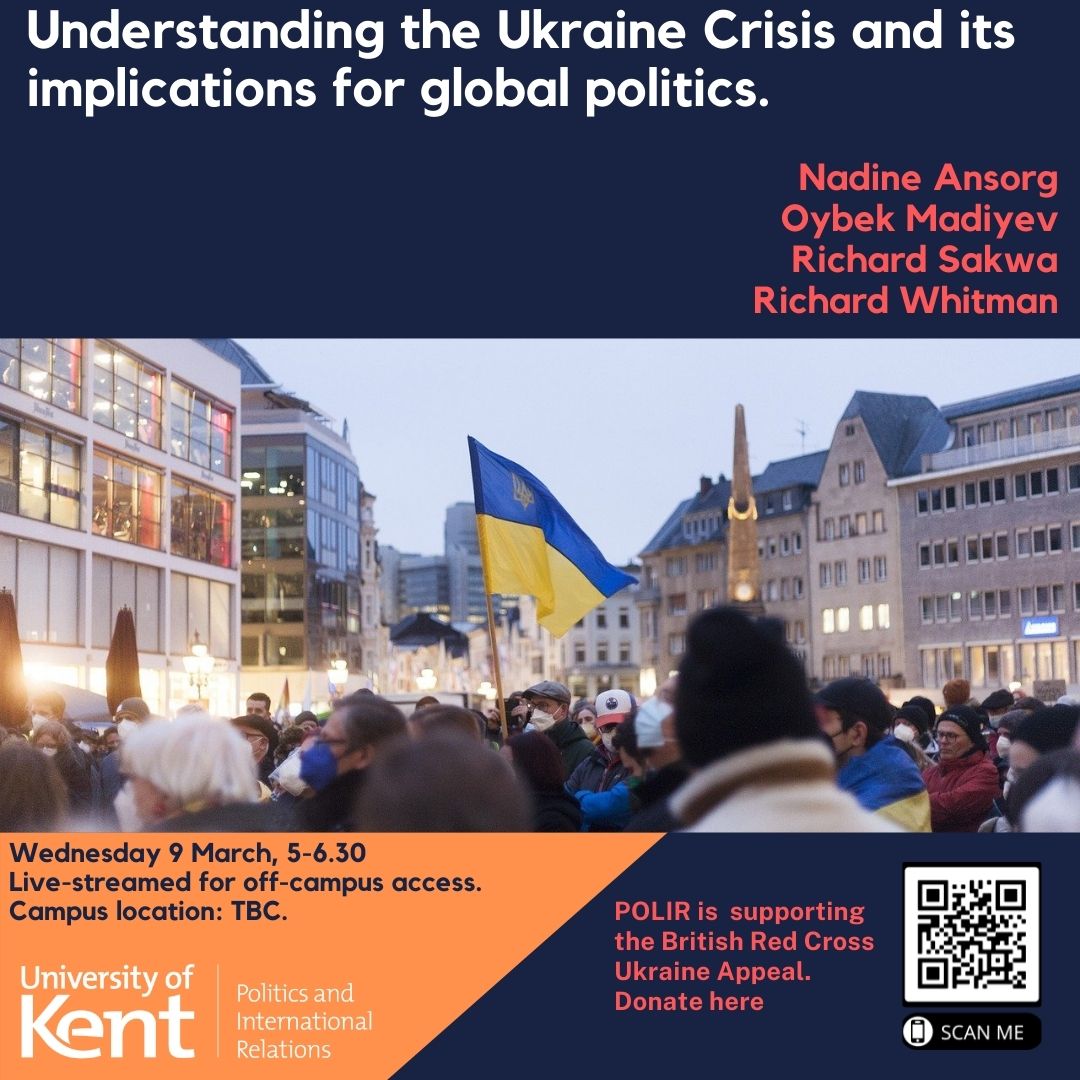
The School of Politics and International Relations held a panel on 9th March on Understanding the Ukraine Crisis and its Implications for Global Politics. The event attracted over 100 students and staff on campus and online.
Speakers at the forum were:
Dr Nadine Ansorg, Head of the School of Politics and International Relations, and an expert on security and German politics.
Dr Oybek Madiyev, Lecturer in Comparative Politics, and an expert on East European and Eurasian politics.
Professor Richard Sakwa, an expert on Russian politics.
Professor Richard Whitman, an expert on foreign policy and European Union politics.
The forum chair was Dr Ben Seyd, Deputy Head of the School.
‘The war on Ukraine has acted as a wake-up call for European governments and publics on the threat that the current Russian regime presents to European security’ Richard Whitman summarised.
‘The position of European governments whether members of the European Union (EU), the North Atlantic Treaty Organisation (NATO), or neither, has been broadly similar.
The war on Ukraine has been interpreted first and foremost as a challenge to the right of European states to determine their own political futures without violence, intimidation or external interference. The consensus view has been an end to Russian hostilities on the basis that Ukraine and its people get to regain the ability to make their own choices about the future from a position of safety and security.
But these European governments individually or collectively (via the EU or NATO) are also not in a position to force or impose the outcome that they would like from Russia. So many now find themselves in the position of (with varying degrees of commitment) fighting a proxy war against Russia in Ukraine.
Supporting Ukraine in its self-defence against Russia’s invasion been the immediate focus of European states and the U.S.-led transatlantic security community. There has been political, financial and (by many states) military assistance commitments. But it isn’t yet clear as to what is the limit of the costs that the nations that support Ukraine are willing to bear. Especially whether the economic costs of the immediate termination of imports of Russia’s oil and gas is a politically realistic option. At present public opinion appears to be ahead of Europe’s political leaders in being willing to accept the costs of further economic measures against Russia.
Successful conclusion of the current Turkey-hosted Russian-Ukrainian negotiations may bring some respite for the horrors currently being endured by Ukraine’s population, but it will not restore the security order in Europe to the situation that existed before invasion on 24th February.
Supporting Ukraine in its self-defence against Russia’s invasion been the immediate focus of European states and the U.S.-led transatlantic security community. There has been political, financial and (by many states) military assistance commitments. But it isn’t yet clear as to what is the limit of the costs that the nations that support Ukraine are willing to bear. Especially whether the economic costs of the immediate termination of imports of Russia’s oil and gas is a politically realistic option. At present public opinion appears to be ahead of Europe’s political leaders in being willing to accept the costs of further economic measures against Russia.
Successful conclusion of the current Turkey-hosted Russian-Ukrainian negotiations may bring some respite for the horrors currently being endured by Ukraine’s population, but it will not restore the security order in Europe to the situation that existed before invasion on 24th February.
With many European governments conducting public debates on their naivety of their previous stance towards Russia (most notably Germany), a rush to make commitments to increase defence expenditure, and consideration of whether to end national taboos (such as seeking membership of NATO in the case of Finland and Sweden), previous certainties on how best to provide for security in Europe has been upended by the war on Ukraine.’
Watch the full event here.




